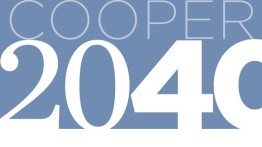Cooper 2040: Tuition Free Programs Versus Equity on the College Campus
Wednesday, February 13, 2019, 12:30 - 2pm

Adriana Farmiga, Associate Dean and Adjunct Professor in the School of Art, and Kit Nicholls, Director of the Center for Writing, co-moderate a discussion about tuition free programs and equity on college campuses. They will be joined by Tiffany Jones, Director of Higher Education Policy at The Education Trust, a national non-profit that advocates for educational equity on behalf of students of color and students from low-income families, and Edward J. Smith, program officer with the Kresge Foundation, a private philanthropic organization working to expand opportunities in America’s cities through grant making and social investing in arts and culture, education, environment, health, human services, and community development.
The event, which will be held in Room 215 of the Foundation Building, is open to current students, faculty, and staff.
Tiffany advises federal and state policy makers, convenes national working groups of civil rights and ed reform advocates, and supports emerging equity coalitions in several states. At The Education Trust, she and her team design and promote policy to make higher education more affordable, hold colleges accountable, and invest in student success. Recent publications include A Guide to Statewide Attainment Goals for Racial Equity Advocates, A Framework for Equitable Free College Programs, and Outcomes-Based Funding and Race in Higher Education. A first-generation college student, Tiffany holds a Ph.D. in Urban Education Policy from the University of Southern California. She previously worked with HBCUs and Hispanic-Serving Institutions for the Southern Education Foundation.
Edward manages a portfolio of grants focused on promoting college opportunity and degree completion for marginalized student groups. He joined Kresge in 2019 after 10 years in education policy research, working to understand how city leaders develop and advance education attainment initiatives rooted in a city’s assets and suited to the needs of its people. Previously, he held positions at the W.E. Upjohn Institute for Employment Research, NASPA’s Research and Policy Institute and the Institute for Higher Education Policy. He holds a Ph.D. from the University of Pennsylvania’s Graduate School of Education, as well as a bachelor’s degree in economics and a master’s degree in education from Pennsylvania State University.




